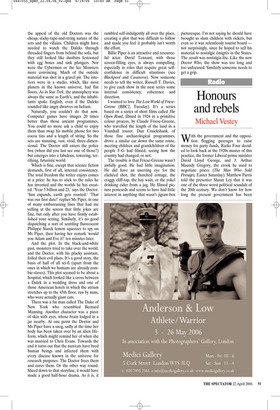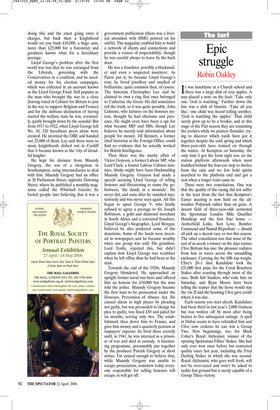Honours and rebels
Michael Vestey
With the government and the opposition flogging peerages to raise money for party funds, Radio Four decided to look back at the 1920s master of this practice, the former Liberal prime minister David Lloyd George, and J. Arthur Maundy Gregory, the crook he used to negotiate prices (The Man Who Sold Peerages, Easter Saturday). Matthew Parris told the presenter Shaun Ley that it was one of the three worst political scandals of the 20th century. We don’t know for how long the present government has been doing this and the exact going rates it charges, but back then a knighthood would set you back £10,000, a huge sum, more than £25,000 for a baronetcy and goodness knows what for a hereditary peerage.
Lloyd George’s problem after the first world war was that he was estranged from the Liberals, governing with the Conservatives in a coalition, and he needed money for his election campaigns, which was collected in an account known as the Lloyd George Fund. Still popular as the man who brought the war to a close (having voted in Cabinet for Britain to join in the war to support Belgium and France) and for the dubious distinction of having started the welfare state he was, eventually, partly brought down by the scandal. But from 1917 to 1922, when Lloyd George left No. 10, 120 hereditary peers alone were created. He invented the OBE and handed out 25,000 of them. Ley said there were so many knighthoods dished out in Cardiff that it became known as the ‘city of dreadful knights’.
He kept his distance from Maundy Gregory, the son of a clergyman in Southampton, using intermediaries to deal with him. Maundy Gregory had an office at 38 Parliament Street, opposite Downing Street, where he published a monthly magazine called the Whitehall Gazette; he fooled people into believing that it was a government publication (there was a liveried attendant with HMG printed on his outfit). The magazine enabled him to build a network of clients and connections and provide a veneer of respectability, though he was careful always to leave by the back door.
He was a fraudster, possibly a blackmailer and even a suspected murderer. As Parris put it, he became Lloyd George’s tout; he loved jewellery and smelled of brilliantine, quite common then, of course. The historian Christopher Lee said he claimed to own a ring that once belonged to Catherine the Great. He did sometimes tell the truth, so it was quite possible. John Lidstone, who lectures on the honours system, thought he had charisma and presence. He might even have been a spy for what became MI5 and MI6, though Lee believes he merely sold information about people for money. Jill Bennett, a former chief historian at the Foreign Office, could find no evidence that he actually worked for British Intelligence.
Then there was the murky affair of Victor Grayson, a former Labour MP, who Lord Clark, a former Labour Cabinet minister, thinks might have been blackmailing Maundy Gregory. Grayson had made a speech accusing Lloyd George of selling honours and threatening to name the gobetween, ‘the dandy in a monocle’. He never did, and soon after he vanished mysteriously and was never seen again. All this began to upset George V, who finally refused to agree a peerage to Sir Joseph Robinson, a gold and diamond merchant in South Africa and a convicted fraudster. Lloyd George’s biographer, Lord Morgan, believed he also pocketed some of the donations. Some of the funds were invested in newspapers and he became wealthy when one group was sold. His grandson, Lord Tenby, rejected this, but didn’t explain how Lloyd George was wealthier when he left office than he had been at the start.
Towards the end of the 1920s, Maundy Gregory blundered. He approached an upright former naval war hero and offered him an honour for £10,000 but the man told the police. Maundy Gregory became the first man to be prosecuted under the Honours, Prevention of Abuses Act. He caused alarm in high places by pleading not guilty, but was persuaded to change his plea to guilty, was fined £50 and jailed for six months, serving only two. The establishment then drove him to France, and gave him money and a quarterly pension at taxpayers’ expense; he lived there secretly until, in 1941, he was interned as a prisoner of war and died in custody. A fascinating programme, presumably put together by the producer Patrick Gregory at short notice. I’m cynical enough to believe that, while Maundy Gregory was unable to escape prosecution, somehow today everyone responsible for selling honours will escape or will get off.



































































 Previous page
Previous page